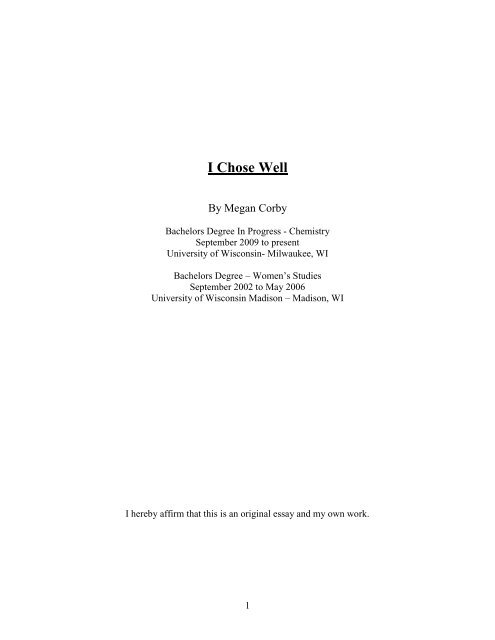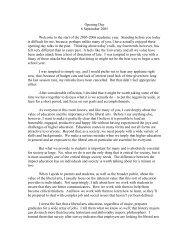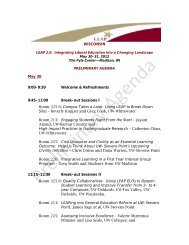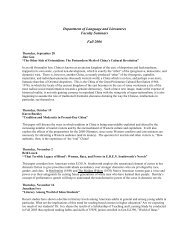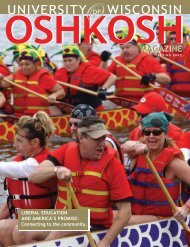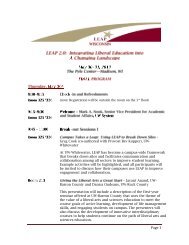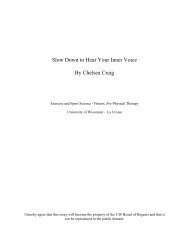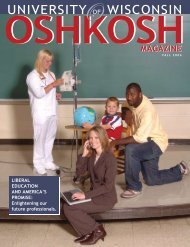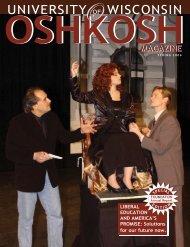Megan Corby - Liberal Education Initiative
Megan Corby - Liberal Education Initiative
Megan Corby - Liberal Education Initiative
Create successful ePaper yourself
Turn your PDF publications into a flip-book with our unique Google optimized e-Paper software.
I Chose Well<br />
By <strong>Megan</strong> <strong>Corby</strong><br />
Bachelors Degree In Progress - Chemistry<br />
September 2009 to present<br />
University of Wisconsin- Milwaukee, WI<br />
Bachelors Degree – Women’s Studies<br />
September 2002 to May 2006<br />
University of Wisconsin Madison – Madison, WI<br />
I hereby affirm that this is an original essay and my own work.<br />
1
I sat next to a woman in my physics lecture. It was the first day of class. We<br />
chatted and found out we were both pre-medicine.<br />
“This is my second bachelor’s, my first one is in Women’s Studies,” I said.<br />
“Me too, my first degree is in Art. Didn’t we choose well?” she said and rolled<br />
her eyes.<br />
Her sarcasm surprised me. Not only has my degree laid the bedrock for my selfdevelopment,<br />
it has also propelled me forward with the confidence and skills to gain<br />
employment in multiple fields. I have been in multiple administrative positions and have<br />
started my own business. I never doubted that my liberal arts degree would prove useful<br />
and marketable. Then again, I had an excellent example right at home.<br />
My mother received innumerable benefits from her college education. After<br />
earning a Bachelors of Arts degree in English at twenty-seven, she went on to have a<br />
plethora of jobs and more than one career. She has been a secretary, a personnel director<br />
of a nursing home, an account executive for an insurance company, and the director of<br />
Human Resources at a university. She’s been a stay-at-home mom, an art teacher, and a<br />
factory worker. In her forties, she built on her liberal arts background by obtaining an<br />
education certificate. She worked as an elementary school teacher for ten years. When<br />
teaching was no longer an option, she became an administrator at a nutritional<br />
supplements company and, finally, the business manager for an integrative medical<br />
clinic. Vibrant and full of life, she is now sixty and suspects that this most recent career<br />
will not be her last.<br />
Social ability is a vitally important skill in the workplace; specifically, the ability<br />
to work with and forge connections with a wide array of people. <strong>Liberal</strong> arts graduates<br />
2
are well read, aware of world events, socially conscious, and flexible thinkers. Their<br />
education provides the cultural knowledge and foundation necessary for effective<br />
communication. As a director of Human Resources at a university, my mom worked with<br />
a bevy of employees, including professors, from all disciplines. Being able to discuss<br />
Nietzsche with a philosophy professor, or share an appreciation for James Joyce with a<br />
literature professor has helped her to connect on a human level with fellow employees.<br />
When she had to inform an employee about changes to his or her benefits, they had a<br />
platform to build from, a relationship. The employees trusted her to hold their best<br />
interests at heart. A broad education provides the backdrop for these relationships. With a<br />
diverse knowledge base, it is easy to make connections with many different people. The<br />
connections forged and trust built between people is an asset not only in the present, but<br />
also towards constructing a strong career.<br />
Unlike my fellow student with the Art degree, I think a broad education allows a<br />
person to build bridges between disciplines. Understanding the advance of science and<br />
industry requires the ability to comprehend the historical conditions that spurred its<br />
progress. Appreciating another person requires realizing the diverse social circumstances<br />
that contribute to identity. As a teacher, my mom built from and expanded her liberal arts<br />
background. She had experience with every subject she taught and, therefore, was able to<br />
teach at a more penetrative level. More importantly, she strived to help students<br />
understand each other and the world around them. She was able to communicate to her<br />
students that nothing happens in isolation. She could draw connections between current<br />
and historical events or link music to mathematics. Constructing bridges between<br />
3
disciplines creates flexible and critical thinking patterns. My mother was able to impart<br />
these skills to her students, instilling a life-long love of learning.<br />
Currently, our economy is recovering from a recession. Many people have been<br />
laid off from specialized jobs and have to wait until their field is once again hiring. A<br />
liberal arts degree confers the freedom to choose, even in times of crisis. It is unlikely to<br />
be stuck in one career with so many diverse skills. My father lost his long-time, wellpaying<br />
job right before the economy took a downturn. My mom had to leave teaching and<br />
find other work in order to make up for the lost income. She began managing a<br />
nutritional supplement company where she was in charge of packaging design,<br />
marketing, accounts receivable and payable, and customer relations. Having no prior<br />
design experience and drawing on her college art classes, she was able to completely<br />
redesign the product packaging. She received rave reviews for her work. She had not<br />
used her art abilities for twenty years, yet they never truly left her. Like riding a bike,<br />
these skills can be recalled when needed and put to work in a novel way. Even in a<br />
struggling economy, her liberal arts background proved marketable.<br />
Many workplaces require specialized skills, and the liberal arts student is uniquely<br />
prepared to zero in on the resources and preparation necessary to meet these specialized<br />
and changing demands. When my mother went to school, computers were not a part of<br />
the curriculum, yet with a solid foundation she has been able to remain current with<br />
technological advances. Her most recent career, as a practice manager of a medical clinic,<br />
required that she attain extensive knowledge of Web-based marketing, Web site design,<br />
and hosting streaming Internet seminars. Despite her lack of formal experience with<br />
computers, she had the ability to search out, learn, and implement the necessary skills in<br />
4
an independent manner. She did research at the library and signed up for classes at the<br />
community college. A liberal arts degree confers the quantitative and information literacy<br />
required to seek out resources, understand them, and to learn independently. Although it<br />
seems counterintuitive, a generalist is exceptionally suited to acquire and execute the<br />
newest skills demanded of employees.<br />
As someone whose responsibilities now include the hiring at a medical clinic, my<br />
mom has a few things she looks for when choosing new employees. Good resumes are a<br />
dime a dozen and a few things make one stand out in an interview. It’s no surprise that<br />
social skills are at the top of the list. She says that medical professionals, no matter how<br />
clinically skilled, must connect with the people they are treating to help them feel<br />
comfortable. She also looks for the ability to think creatively and to be flexible. Front<br />
desk and administrative staff encounter a wide assortment of billing statements, medical<br />
reports, and confidential correspondence. They need to be able to interpret each new item<br />
uniquely and process it appropriately. My mom believes a liberal arts background is a<br />
more precise indicator of success than a specialized degree - and she knows this from<br />
experience.<br />
Throughout my life, my mother has remained a role model and mentor. She<br />
understands that a career is not something most people are handed straight out of college;<br />
it is something built over time. Creative and flexible thinking, social skills, cultural<br />
intelligence and, most importantly, the ability and confidence to learn new skills all play<br />
integral roles in career development. I have witnessed how my mother’s liberal arts<br />
education has given her the freedom to create a unique path. Seeing her accomplishments<br />
5
and equipped with the knowledge from my own liberal arts background, I can succeed at<br />
any career (or careers!) I choose.<br />
6


